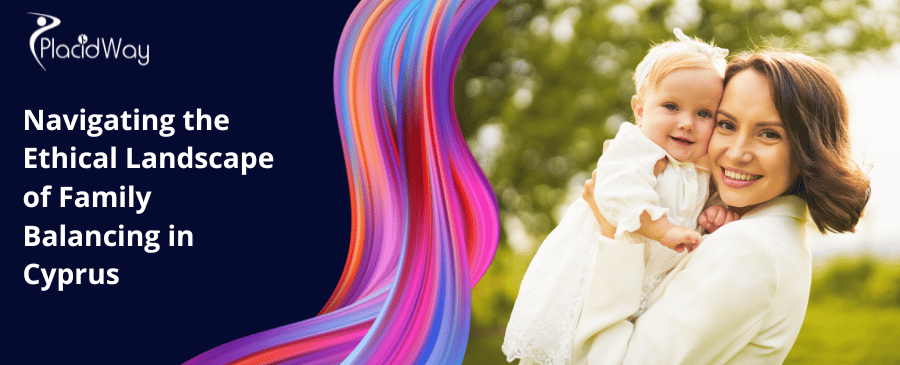Ethical Guide to Family Balancing in Cyprus - A Deep Dive

In the heart of the Mediterranean, Cyprus stands not only as a crossroad of cultures but also as a focal point for a modern ethical debate: family balancing. This practice, often nestled under the broader umbrella of reproductive technologies, has sparked discussions across various spectrums, from medical ethics to cultural norms. This blog post aims to delve into the intricacies of family balancing in Cyprus, exploring its ethical implications, societal impact, and the legal framework that governs it.
What is Family Balancing?
Family balancing refers to the use of medical interventions to increase the chances of having a child of a specific sex, typically after having one or more children of the opposite sex. This practice is part of a larger field known as preimplantation genetic diagnosis (PGD), where embryos created through in vitro fertilization (IVF) are screened for genetic disorders and, in the context of family balancing, sex selection.
The Ethical Debate
The ethical landscape of family balancing is complex and multifaceted. Proponents argue that it allows parents to achieve a desired family composition, contributing to family happiness and societal balance. However, critics raise concerns about the commodification of life, potential gender imbalances, and the slippery slope to designer babies.
In Cyprus, this debate is particularly poignant due to the island's rich cultural tapestry and its progressive stance on reproductive technologies. The country has become a hub for fertility tourism, attracting individuals and couples from around the globe seeking treatments unavailable in their home countries.
Societal Impacts and Concerns
One of the primary concerns with family balancing is the potential for gender imbalances within the population. Historical precedents in other countries have shown that a strong preference for one gender can lead to societal and demographic challenges. However, in Cyprus, the practice is regulated to ensure that it is used responsibly, aiming to maintain demographic stability.
Another societal concern is the ethical implication of selecting for non-medical traits, such as gender. This raises questions about the value placed on different genders and the societal roles and expectations that come with them. Critics argue that this could reinforce gender stereotypes and inequalities.
Legal Framework in Cyprus
Cyprus has established a legal framework that allows for family balancing under specific conditions, reflecting a balance between technological advancement and ethical considerations. The legislation is designed to prevent misuse and ensure that the practice is in line with ethical standards, focusing on the welfare of the child, the family, and society at large.
The law permits sex selection for family balancing purposes only after a family has one or more children of the opposite sex, and it requires counseling and consent processes that ensure parents are fully informed of the ethical and societal implications. This framework aims to strike a balance between individual freedoms and societal values.
Cultural Perspectives
Cyprus's unique position at the crossroads of Europe, Asia, and Africa has cultivated a diverse cultural landscape that deeply influences perspectives on family and reproduction. While modernization and technology have made their mark, traditional values still play a significant role in shaping opinions on practices like family balancing.
The diverse religious and cultural backgrounds in Cyprus contribute to a broad spectrum of views on the matter, from acceptance to skepticism. Engaging with these perspectives is crucial for fostering a dialogue that respects both individual choices and cultural sensitivities.
Moving Forward: Ethical Considerations and Future Directions
As technology advances, the ethical considerations surrounding family balancing and reproductive technologies will continue to evolve. The key to navigating this landscape lies in ongoing dialogue among stakeholders, including medical professionals, ethicists, policymakers, and the public.
some of the best clinic for this process are:
Future discussions should focus on refining ethical guidelines, considering the impact of these technologies on future generations, and exploring the role of education in shaping societal attitudes towards gender and reproduction. Moreover, international collaboration could play a pivotal role in establishing consensus on best practices and ethical standards.
Get Gender Selection in Cyprus
Family balancing in Cyprus represents a microcosm of the broader ethical debates surrounding reproductive technologies. By exploring the ethical, societal, and legal dimensions of this practice, we can better understand the complexities involved and the importance of a balanced approach that respects individual desires while safeguarding societal values.
As Cyprus continues to navigate this ethical landscape, it serves as a case study for the world on how to balance the promise of medical technology with the preservation of ethical integrity and societal harmony. The ongoing conversation around family balancing in Cyprus underscores the need for thoughtful consideration of the myriad implications of reproductive technologies, ensuring that progress in this field is both ethically sound and socially responsible.
In the end, the journey through the ethical landscape of family balancing in Cyprus teaches us about more than just the specifics of reproductive technology; it offers insights into the human condition, the values we hold dear, and the future we wish to build for the next generations.









.png)
.png)
.png)

.png)
